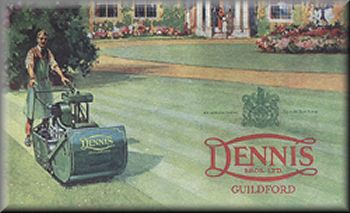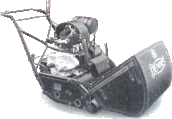A Brief History of Dennis Mowers

After the first world war, Dennis rapidly changed back to peacetime
production. Demand for buses was present but the availability of ex-wartime
lorry chassis meant that demand for heavy lorries was depressed. Dennis
were supplying many vehicles to Local Authorities vehicles such as vacuum
gully emptiers, street sweepers and dust carts and ever mindful of developing
new markets, they hit on the idea of producing lawnmowers. This was a natural
extension to other supplies to the municipal sector and helped to fill
production capacity in the factory.
The first Dennis mower was displayed to a slightly surprised public
at the Royal Agricultural Society's show at Derby in July 1921. It was
quite novel in its design, using a two-stroke engine and an arrangement
whereby the grass box could be inverted to provide a cover for the engine.
However, the machine was not a success and it is believed that none were
sold. The resulting re-design led to the introduction of a more conventional
machine. It immediately became accepted by users and was well up to the
job, acclaimed for its robustness and simplicity. It incorporated differential
gearing in the three-part main roller, making it easy to turn what was
in fact a quite heavy machine. It also retained the grass box engine cover
design from the earlier machine design. In 1925 a mower was supplied to
Windsor castle. This led to the granting of a Royal Warrant. The Royal
Air Force placed orders for several hundred mowers. Early machines used
proprietary engines from Bradbury and Blackburn and from 1928 home-produced
600cc Dennis engines were fitted. The mower design remained basically unchanged
for many years although improvements in detail were incorporated almost
every season. Over 10,000 mowers were sold up to the outbreak of the second
world war when Dennis efforts were directed to the war effort and mower
production was stopped.
Lawnmower production resumed after the second world war in 1946. The
breed now became known as the Z type and a new numbering series was started.
Frame re-design took place in the mid 1950s and the Z type with the fixed
cylinder head engine remained in production until 1960. After this Z serial
numbers from Z101 continued and were applied to the first 'Premier' machines
with removable cylinder heads. Production of 'Paragon' machines started
about 1965. From 1960 trailing gang mowers known as 'extra cuts' were produced,
to be drawn behind the trailed seat.
In 1972, the Dennis company became part of the Hestair Group. Mower
production had by this time already been concentrated at a Hestair subsidiary,
Stanhay at Ashford in Kent. Some mower parts were supplied by sub-contractors
and one of these was Godstone Precision Engineering, in Surrey. This company
acquired the rights to the Dennis motor mower designs in 1976 and building
was transferred there, continuing to manufacture the 'Premier' type. The
trailed gangmower subsidiary was acquired by Howardson, also in 1976. Later,
Godstone was in financial difficulties and in 1981 ownership and the rights
to Dennis motor mower designs were bought by Howardson and production was
transferred their works near Derby. By this time, the Dennis engine had
been discontinued and Howardsons updated the 'Premier' and 'Paragon' designs,
introducing new types of engine with electric starters.
Howardsons put in hand further mower developments and products continued
to be improved. Other engineering concerns were bought over the years and
these including JP Mowers and Sisis, enabling an expanded range of products
to be offered. The G series mower has been launched, sold the world over
and in use at many famous sporting stadia and world-cup venues, this having
a strong family resemblance to the earlier Dennis Paragon. Manufacture
of the modern generation of Dennis Lawnmowers and other ground maintenance
machines continues at Howardsons to the present day, all-electric mowers
now being produced. Howardsons policy of range expansion and product development
means that new mower models continue to be offered. Design and development
are still at the forefront of their ethos demonstrating that British engineering
is still very much alive.

To see a selection of preserved Dennis lawnmowers,  Click Here Click Here | 
